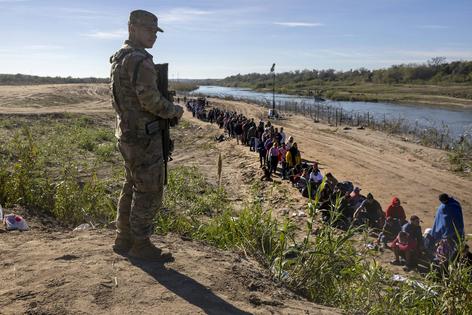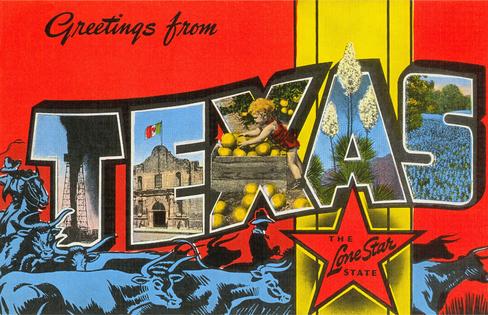Supreme Court lets Texas’ immigration law stand, intensifying fight between Texas and the US government over securing the Mexico border
Published in Political News
The U.S. Supreme Court issued an opinion on March 19, 2024, that Texas can – at least for now – have state authorities deport undocumented migrants, which has traditionally been the federal government’s responsibility.
Three liberal judges dissented from the opinion that temporarily backed Texas’ controversial new law, known as Senate Bill 4.
“That law upends the federal-state balance of power that has existed for over a century, in which the national government has had exclusive authority over entry and removal of noncitizens,” Supreme Court justices Sonia Sotomayor, Elena Kagan and Ketanji Brown Jackson wrote in their dissent.
The Biden administration had tried to block Texas’ enforcement of SB 4, maintaining that the state law is “flatly inconsistent with federal law,” according to a letter U.S. Solicitor General Elizabeth Prelogar wrote to the Supreme Court justices.
The Supreme Court’s decision tossed the question of SB 4 to an appeals court for a ruling. With this 6-3 ruling, the justices also foreshadowed how they could ultimately rule on SB 4 if a ruling by the 5th Circuit Court of Appeals is itself appealed to the Supreme Court in the near future.
This decision follows shortly after a failed Senate proposal to tighten border security and make it tougher for people to get asylum in the U.S. It also coincides with Americans’ rising concern about immigration.
Texas Gov. Greg Abbott has been battling with the Biden administration since 2021 over the state’s ability to secure its border with Mexico. Under Abbott’s leadership, Texas has sent Texas National Guard troops and state troopers to its 1,254-mile-long border with Mexico. Texas is the only border state that has built its own wall, partially dividing itself from Mexico. Texas has also constructed more than 100 miles of other barriers along the border.
I am a scholar of Texas politics and government at Rice University’s Baker Institute. Texas’ attempts to control its border with Mexico and intervene on immigration issues – historically both the responsibility of the federal government – derive in part from the fact that many Texans believe that their Lone Star State is unique.
Texas, for starters, is the largest U.S. state among the lower 48, geographically speaking, and the second-most populous after California. It has a distinct state culture and the history of being an independent republic.
Today, Texas is the most powerful and influential red state, pushing back against the Biden administration on many policy issues. It is also home to a small but growing political movement advocating for Texas to secede from the U.S. and become an independent country.
There is a great deal of truth to the popular saying that everything is bigger in Texas.
Over the past several months, Texas has become increasingly enmeshed in a series of skirmishes with the Biden administration over border security and immigration. Abbott, bolstered by Republican voters and the unanimous support of Texas Republicans who dominate the state Legislature, has made Texas more involved in day-to-day border security and immigration enforcement than any state in recent history.
In December 2023, Abbott signed SB 4, which made it a state crime to cross the border illegally and also gives Texas judges the power to deport undocumented migrants. SB 4 will now be implemented, at least until the 5th Circuit Court of Appeals reaches a decision in April.
Abbott’s border security interventions are funded by a 2021 state initiative called Operation Lone Star. During the program’s first two years, Texas spent US$4.4 billion on a multifaceted strategy that includes, for example, sending Texas National Guard troops to the border. In some cases, these National Guard troops have blocked U.S. Border Patrol agents from patrolling the border.
Now, Texas is spending $5.1 billion on trying to patrol the border from 2023 through 2025.
This doesn’t include the additional $1.5 billion Texas has allocated for expansion of its border wall over the next few years.
Since 2022, Texas has sent more than 100,000 immigrants who arrived in Texas to liberal cities such as New York and Chicago.
And in 2023, Texas constructed a buoy barrier in the middle of the Rio Grande, although a federal appeals court ruled in December that Texas must remove those barriers from the river.
The Biden administration has challenged virtually all of these actions in court.
The federal government argues that Texas’ border and immigration activity is unconstitutional, since only the federal government can enforce immigration law. The federal government maintains that the new Texas immigration law that allows state authorities to deport migrants also would interfere with the federal asylum process.
In response, Texas says that its border and immigration work is legal, in part because the federal government cannot adequately secure the border. Abbott and other Republicans characterize migrants crossing into Texas as an “invasion,” which they say gives Texas the right to defend itself, as they say the U.S. Constitution allows.
Understanding Texas’ particular history and Texans’ sense of pride for their state helps to better understand the context behind this current conflict.
In Texas, you can’t travel far without seeing the Texas flag fluttering outside of houses and business storefronts. It is quite common to see people carrying Texas flag-themed Koozies, or wearing Texas flag shirts and hats.
Texas is one of the only U.S. states that went directly from being an independent republic – from 1836 to 1845 – to getting statehood. More than nine out of 10 Texans voted for Texas to become part of the U.S. in 1845.
Texas has also been led continuously by a Republican governor since 1992, when George W. Bush was first elected. No Democrat has won any statewide race in Texas since 1994.
Today, Texas’ executive branch, led by Abbott, Lt. Gov. Dan Patrick and Attorney General Ken Paxton, is the country’s most powerful and vocal opponent of the Biden administration.
While the Texas state government is challenging the federal government’s immigration and border powers, there has also been a rise in support for a political group called the Texas Nationalist Movement, which since 2005 has been advocating for Texas to secede from the U.S.
Texas’ Republican political leaders have not embraced this secession movement, often called “TEXIT.” Recently, Matt Rinaldi, the ultra-conservative chair of the Texas Republican Party, kept a Texas secession proposition off the Republican primary ballot.
Abbott and other Texas Republican politicians agree with former conservative Supreme Court Justice Antonin Scalia, who wrote in a letter in 2006, “If there was any constitutional issue resolved by the Civil War, it is that there is no right to secede.”
But these same Republicans still want Texas to have greater state autonomy from the federal government.
Abbott and other Texas Republicans continue to assert their right to secure the border and deport undocumented immigrants because they say the federal government is failing to do either effectively.
In addition, Republicans continue to use immigration and border security as a top issue to rally Republican and independent voters heading into the 2024 election.
And, while TEXIT is not going to happen, Texas Republicans will continue to vigorously promote Texas autonomy, appealing to their voters’ Texas pride.
This is an updated version of an article originally published on Feb. 29, 2024.
This article is republished from The Conversation, a nonprofit, independent news organization bringing you facts and trustworthy analysis to help you make sense of our complex world. It was written by: Mark P Jones, Rice University
Read more:
Immigration reform has always been tough, and rarely happens in election years - 4 things to know
Biden defends immigration policy during State of the Union, blaming Republicans in Congress for refusing to act
The US is struggling to handle an immigration surge – here’s how Europe is dealing with its own influx
Mark P Jones does not work for, consult, own shares in or receive funding from any company or organization that would benefit from this article, and has disclosed no relevant affiliations beyond their academic appointment.




































































Comments